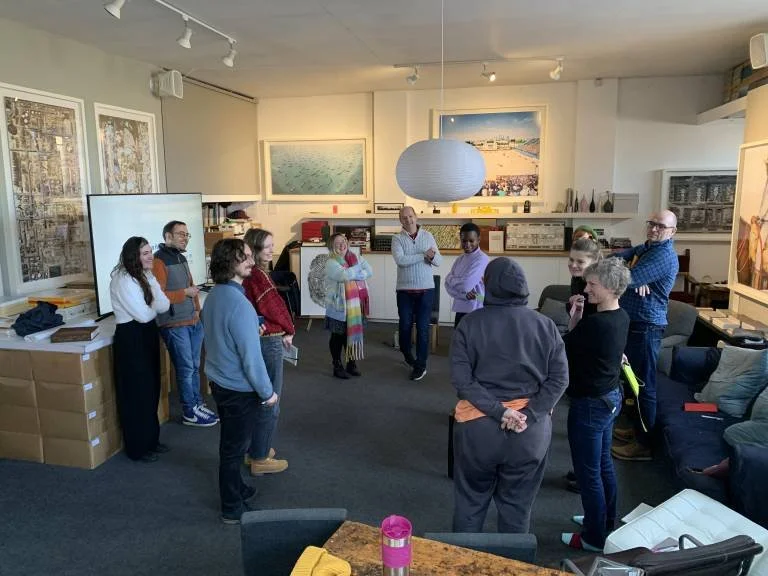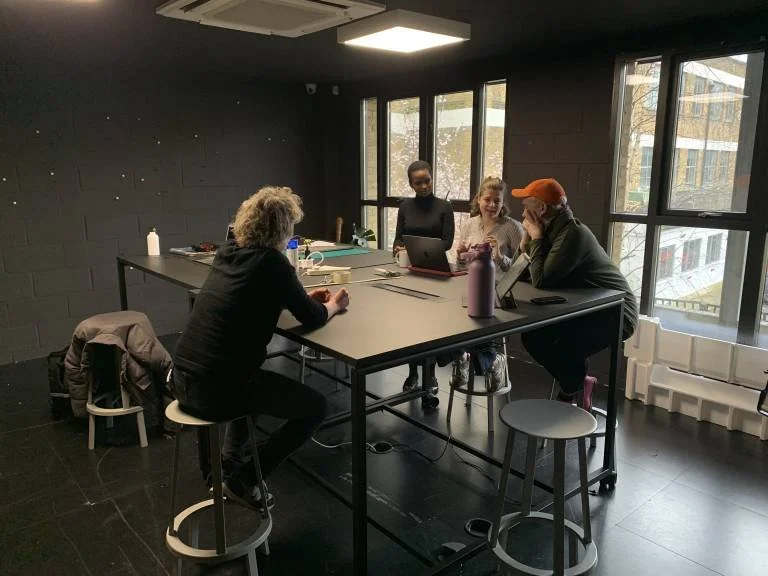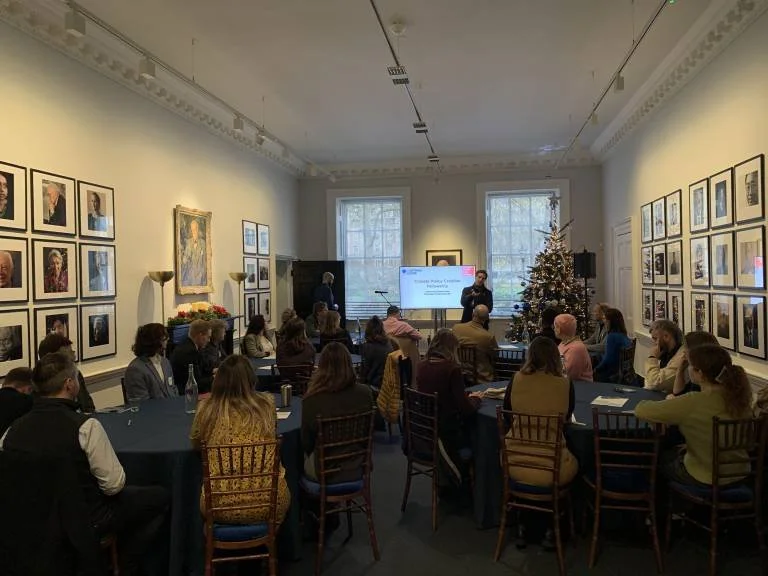The Climate Policy Creative Fellowship: a look under the hood
Between November 2024 and January 2025, the Strategic Climate Risks Initiative delivered the Climate Policy Creative Fellowship alongside partner organisations UCL Climate Action Unit and Fast Familiar.
From an initial 600 applications for this pilot programme, eight creative sector professionals were chosen to participate.
The purpose of the Fellowship
The aim for fellows was to create story ideas that could help policymakers to see new opportunities for taking action towards a low-carbon society even as the consequences of climate change become harder to manage.
Traditionally, creative projects on climate change have focused on getting the general public emotionally engaged in order to drive action. Some artistic endeavours do this by showcasing the impacts of climate change, or by trying to improve people’s awareness of the problem.
With this fellowship, the aim instead was to experiment with how creative ideas could be used to help policymakers to see new possibilities for how they can help society navigate to a low-carbon future.
The story ideas developed in the Fellowship focused on policymakers as their audience, because their decisions have the power to shape the systems that make up society. When policymakers explore new possibilities for taking action themselves, they can unlock the ability of people across society to play a more active role in reaching a low-carbon future.
Based on the UCL Climate Action Unit’s wider work with the policymaking sector, we know decisionmakers have ready access to the scientific facts about climate change. They also have a host of experts advising them on potential solutions. What many are missing, however, is an understanding of how to get to the future they want to realise.
This type of information lends itself to creative mediums of storytelling: when an audience explores the experience of doing something in a creative setting, they can more easily imagine what it would be like to do it in their professional setting.
What made this fellowship unique?
Working on climate stories is one of the key themes of the Climate Action Unit’s work. There is, in our experience, a lack of variety in the types of stories that exist about climate change.
On the one hand, it is common for news items, documentaries and films to depict a story of climate catastrophe. The message is often one of societal breakdown in the face of natural disasters. These storylines are dystopian, intending to warn an audience of what could happen if society doesn’t change course.
On the other hand, if you dig a little deeper, there are examples of utopian storylines. In some stories, humans unearth a ‘silver bullet’ technical fix for climate change; in others, society has successfully addressed climate change before the action of the story even begins. These kinds of stories offer us escapism but are of little use to us in the here-and-now.
One genre of stories that society lacks is those that inspire people to think about how they can take action in the present day, amid worsening climate change, to reach a desirable future. This ties into the Climate Action Unit’s wider storytelling work: shifting the focus away from communicating about the 'issue’ of climate change, and towards stories of 'doing' something about it. This is the unmet need that the Climate Policy Creative Fellowship set out to address for the policymaking audience.
In focus: stories about ‘derailment risk’
In particular, the Fellowship aimed to create stories which help policymakers address ‘derailment risk’. Derailment risk is a term used to describe the possibility that the consequences of climate change will get in the way of the world’s ability to tackle its causes.
Laurie Laybourn, Executive Director of SCRI and host of the Fellowship, explains derailment risk using concrete examples.
"An example of this could be an increase in political polarisation - caused by a complex interaction between climate shocks, inflation, and living standards - which leads to more success for populist climate-sceptic parties. This could limit a country’s ability to reduce their carbon emissions and take adaptation action, which could lead to worsening climate impacts and increasing political polarisation – creating a vicious cycle.”
Derailment risks are a complex challenge because it is difficult to understand how action can be taken to break these cycles, or to prevent them from happening. Creative storytelling can help audiences to understand these risks and to see new opportunities for taking action.
Laybourn explains how stories can help policymakers in their roles:
“Stories can help us to map out how derailment risks might affect our societies, and to engage our critical imaginations in discovering how we can take action. And they can help policymakers in particular: the stories they listen to and that they tell can build their collective capacity for navigating the worsening climate storm.”
What the creative fellows did
Over the course of three months, the fellows developed ideas for creative projects that could help policymakers imagine the actions they might need to take to get to a low carbon future. They developed these ideas through a set of experiences, working together as a cohort and interacting with a range of policy experts.
In the early workshop sessions, the fellows gained insights informed by the scientific literature behind how the brain processes risks, how science is traditionally communicated to policymakers, and the role of values and emotions in storytelling.
In other sessions, the fellows gained on-the-ground insights by engaging with policymakers. A day of interactive conversations and exercises with colleagues from a range of government departments enabled the fellows to understand the obstacles decisionmakers face when trying to push for action on climate change amid competing priorities.
Seven climate action creative projects
By the final workshop, fellows had developed seven creative concepts to help policymakers see more possibilities for taking action to tackle climate change and specifically to address derailment risks. All of the concepts feature stories that mirror the situations they routinely face in the course of their work.
One of those concepts is a social experiment reality-TV format which invites members of the public into decision-making positions in UK government. They are tasked to keep the country running and deliver on their policies as climate-related events threaten to derail their efforts. Meanwhile, a backroom of real-world experts provide commentary on the participants’ choices, their options and the trade-offs of each.
Another concept is a podcast series exploring moments in history when policy actions have successfully enabled society to transform in spite of (or in response to) moments of crisis. The series examines what positive change occurred and the steps policymakers took to make it happen.
The organisations involved
The Fellowship was hosted by the Strategic Climate Risks Initiative and delivered in partnership by the UCL Climate Action Unit (CAU) and digital storytelling studio Fast Familiar.
The CAU led on exploring the sectoral links between policymaking and academia, as well as the neuroscience of communicating about climate change.
Fast Familiar led on facilitating new creative practices and unpicking how creative experiences can help audiences engage with a subject like climate change.




